When author Elizabeth Gilbert coined the phrase, “Creativity itself doesn’t care at all about results – the only thing it craves is process,” she clearly hadn’t attended an artist development workshop like “
Americans for the Arts is extremely passionate about this mission. The organization acts as an educational crusader throughout the country and strives to build stronger connections within local communities. As the primary host for this year’s workshop, it aligned with Broward Cultural Division for an all-day interactive experience dedicated to creative problem solving and how it directly affects communities.
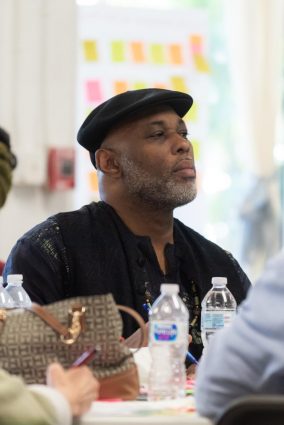
While creativity itself may not care about results, the keynote speakers at the workshop certainly did, and offered creative problem solving as a viable option to highlight both process and solution.
When it comes to innovation and originality, nothing counts more than active imagination and artistic individuality. Recycling the same technological advancements, for instance, fails to move us forward as a whole, and keeps us repeating the same cultural patterns. One notable takeaway from the workshop was the idea that an artist can use their specific talent and medium to connect with the general public and help transform public problems into never-before-thought-of solutions — the notion that creativity seeks to drive us further, and in ways we never thought possible.
So, what is creative problem solving? When the same cookie-cutter thinking produces one-dimensional results, the need for inspiring originality increases. As a method to solving public policy problems, ad executives Alex Osborn and Sid Parnes developed a four-step process to help individuals harness their unique talents for imaginative application: 1.Clarify 2. Ideate 3. Develop 4. Implement to help foster particular individual creative strengths.
The ultimate message is whether you’re a professional artist or bussing tables at a restaurant (or both), anyone can use their own unique creative expression to tap into solutions that truly change their community and continue to drive us forward as a culturally-motivated society.
At the Artists at the Community Development Table Workshop by Joannie Cox-Henry.
The artists who attended the January Artists at the Community Development Table Workshop hosted by Broward Cultural Division and the non-profit organization Americans for the Arts (AFTA), began their morning in a room filled with shy, unfamiliar faces. By the end of the nine-hour workshop, group poems had been penned, innermost thoughts had been shared and friendships had been made. There was a genuine buzz of human connection in the air and the impact of this workshop was readily apparent.
The workshop brought together dozens of artists for an honest discussion about what art really brings to the community development table.
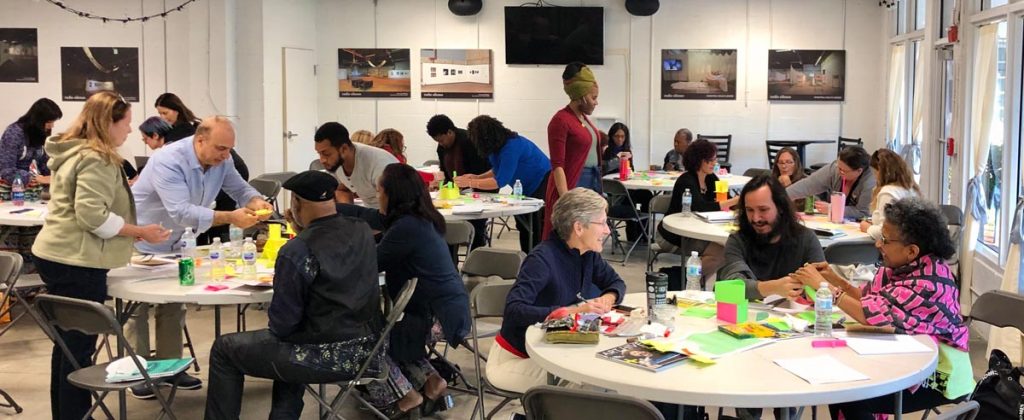
The free, immersive experience was all about illustrating how artists can impact public policy, civic systems and community growth and how empowering artists can lead to dynamic solutions within communities. Americans for the Arts, whose primary focus is advancing the arts in the United States, selected Fort Lauderdale as a workshop site along with five other cities in Tennessee, Alabama, Washington, Maryland and Louisiana.
“Our goal is to offer arts-based solutions to community development,” said Marissa Shadburn, Americans for the Arts field education coordinator.
Broward Cultural Division Grants Management Specialist Erica Mohan coordinated with AFTA to bring the event to South Florida after attending a similar event in Oakland, California. “I was grateful AFTA considered coming here. We were very lucky,” Mohan said. “During the Oakland workshop, art agencies from 48 states were being represented.” She thought “It would be a really great opportunity to teach local artists and eventually develop our own version of this program.
Broward Cultural Division Grants Management Specialist Erica Mohan helped bring the event to South Florida after attending a similar event in Oakland, Calif. “I was grateful AFTA considered coming here. We were very lucky,” Mohan said. “During the Oakland workshop, art agencies from 48 states were being represented.” She thought “It would be really great to teach artists here and eventually develop our own version of this.”
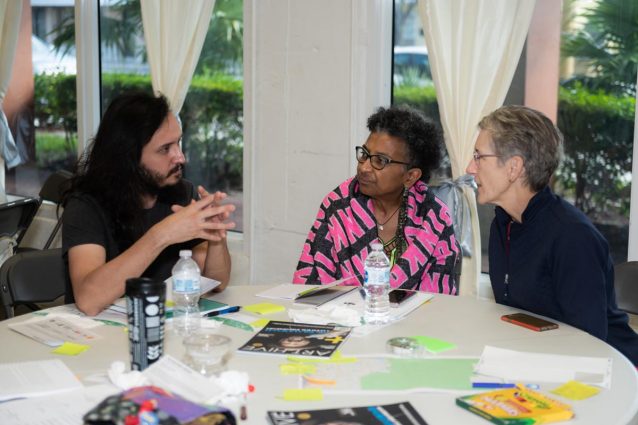
The workshop was well timed as the Broward Cultural Division begins a new focus on restructuring its significant grant program and goal of working together with the local community.
“We’re thankful to Erica for her efforts in helping to bring this here,” said Broward Cultural Division Grants Administrator James Shermer. “We’re always looking for new ways to be more involved with the community.”
Talks of a potential follow up workshop are currently in the early planning stages.
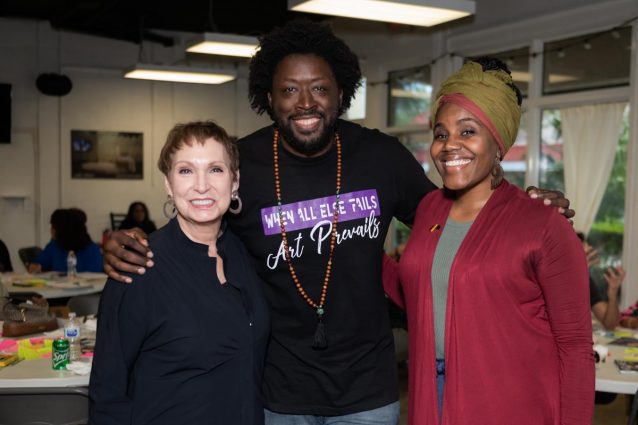
“Our goal is to talk about how artists can work in our community and how important they are,” said Roseann Weiss, a creative strategist who worked at the Regional Arts Commission of St. Louis for 14 years and was a major force behind the Community Arts Training Institute, which has inspired more than 300 artists to collaborate.
Weiss was a leader of the Fort Lauderdale workshop along with artist Pacia Anderson. The duo delivered practical tips and tools aimed at empowering artists to become forces in their communities, develop community identity and work together to overcome challenges.
“Artists need training and to talk about what the issues are. It’s important to also be working in communities you’re not necessarily a part of. It’s not something that happens overnight. Relationships are key.”
Roseann Weiss
Anderson shared the story of The Pink House, which served as an arts and culture community hub for several years before it shut its doors in 2016. “The Pink House was a very transformative place for so many,” said Anderson. “What made it so special is art was never a separate thing there. It was everything.”
The art of people creating culture and not the other way around was also a central talking point for Anderson. “We need to be very intentional in the arts about equity and having an awareness about the culture we’re creating is very important,” Anderson added.
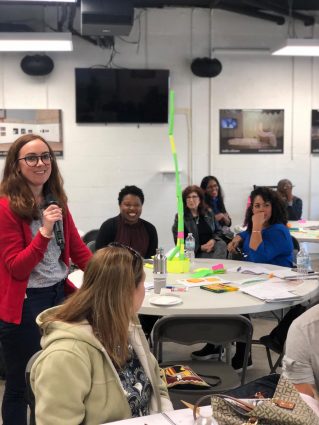
For this workshop, South Florida-based poet, playwright, director and educator Darius Daughtry and Tara Chadwick, whose titles include transformative art catalyst, community cultural consultant, museologist and curator, also led segments and group exercises.
“This workshop was about being part of an intentional process to build the capacity of local community in Broward and to bring artists awareness of their participation in community development,” Chadwick said. “
“Putting the art and the artist back in community development is crucial to our next 100 years and next thousand years,” Chadwick said. “We need to relate to each other.”
Funded by the Andrew W. Mellon Foundation, this workshop also posed the question of how artists can work together to inspire positive change in the community.
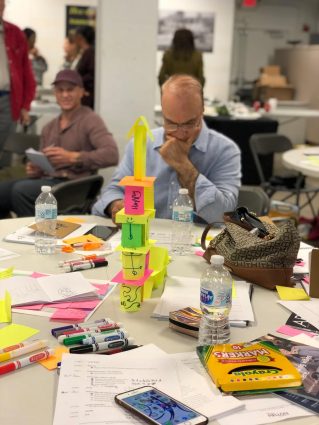
“I work with core artists and building community through storytelling,” said Daughtry, who is also Founder and Artistic Director of the Art Prevails Project, a not-for-profit organization rooted in theater and creative writing designed to educate and inspire through cultural experiences.
“We are complete experts on what’s happening in our city from societal issues to social justice. When all else fails, art prevails. We’re being more intentional about the work that’s actually happening and by working together, we’re having varied voices at the table.”
The free, immersive experience was all about illustrating how artists can impact public policy, civic systems and community growth and how empowering artists can lead to dynamic solutions within communities.
Americans for the Arts, whose primary focus is advancing the arts in the United States, selected Fort Lauderdale as a workshop site along with five other cities in Tennessee, Alabama, Washington, Maryland and Louisiana. “Our goal is to offer arts-based solutions to community development,” said Marissa Shadburn, Americans for the Arts field education coordinator.
Broward Cultural Division Grants Management Specialist Erica Mohan coordinated with AFTA to bring the event to South Florida after attending a similar event in Oakland, California. “I was grateful AFTA considered coming here.
We were very lucky,” Mohan said. “During the Oakland workshop, art agencies from 48 states were being represented.” She thought “It would be a really great opportunity to teach local artists and eventually develop our own version of this program.
All images by Downtown Photo except where indicated.